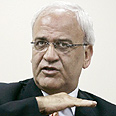
The Palestinians are making it clear that they will not hesitate to take their fate into their own hands: Top Palestinian negotiator Saeb Erekat on Sunday said the Palestinians are determined to obtain the international support necessary to approach the UN Security Council with the demand to declare a Palestinian state in the borders of June 1967.
Erekat made this statement after a meeting with the European Union's Mideast envoy. The negotiator said the Palestinians still prefer the two-state solution, along with solutions to the problem of Jerusalem, refugees, borders and the release of prisoners.
But, he said, Israel's conduct is destroying the two-state option, and it will be held accountable for this.
Mohammed Dahlan, a senior official in Abbas' Fatah faction, told reporters Sunday that the diplomatic initiative had been agreed by the Palestine Liberation Organization executive which Abbas chairs. "We are now leading a diplomatic battle," he said.
The initiative would be "a real test of the intentions of the international community," he said. "If the American administration does not agree, that will be another setback."
The United States, which had called for a freeze of Israeli settlement activity in the West Bank, eased the pressure in September by calling only for "restraint," in a change of policy that frustrated the Ramallah-based Palestinian leadership.
In the event of failure at the Security Council, where the United States wields veto power, Dahlan said other options included a unilateral declaration of statehood and "popular, comprehensive resistance against settlement and the occupation."
He did not spell out what that might entail. In the past two decades, the Palestinians have twice launched uprisings in the occupied territories.
These statements come just hours after Defense Minister Ehud Barak stressed in Sunday's cabinet meeting that it was in Israel's strategic interest to reach an agreement with the Palestinians through negotiations.
"We must always look at the alternatives – and without an agreement, there is a chance that support of the Palestinian unilateral declaration may grow, and there will be a rising demand for the establishment of a bi-national state," Barak said.
Meanwhile, Hamas responded to the PLO's plans to transfer authority from the Palestinian Legislative Council to the PLO's Central Council, thus phasing Hamas out of power.
Secretary-General of the Legislative Council Dr. Mahmoud al-Ramahi said the PLO does not have the authority to make such a move and that there is only one option – to dismantle the Palestinian Authority.
Al-Ramahi added that anyone thinking of transferring authority to the PLO must ask themselves if they have the legal standing to do so.
Earlier Sunday, former Prime Minister Ehud Olmert said at the Saban Forum in Jerusalem that negotiations must be picked up with the Palestinians from the point at which they left off.
"The Palestinians must respond positively to the peace offer I offered them from the Israeli government led by me. They will not receive a better offer than that. The ball is on their court."
In regards to Syria, Olmert said, "The indirect negotiations took place in complete secrecy. There is no need to continue them. Direct talks must be opened. Both sides know what they must do in order to reach an agreement."
Attila Somfalvi and Reuters contributed to this report















